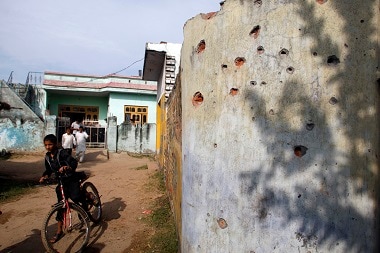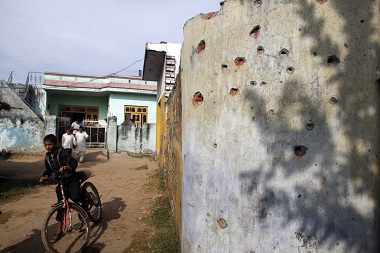It is difficult to imagine the cliffhanging drama that unfolded as Indian troops landed in Kashmir on 27 October 1947. The place was in limbo, the Maharaja having left Srinagar for Jammu in a long convoy at 2 am on the night of 25 October, a few hours after signing the accession. At the Cabinet meeting on 26 October, Nehru insisted that the accession must have the people’s backing. So, Sheikh Adbullah sent in a quickly scribbled note on behalf of the National Conference. He was sitting in the next room, having brought his family down to Delhi. [caption id=“attachment_2484196” align=“alignleft” width=“380”]  A boy cycles past a wall damaged in alleged firing from the Pakistan side of the Kashmir border, at Mawa village, in Samba district, about 58 kilometers south of Jammu, on Saturday, 24 October, 2015. AP[/caption] At dusk, companies of the Sikh regiment were scrambled from their Gurgaon billet. On the morning of 27 October, Dakotas flew them to Srinagar. Anxious National Conference leaders were scanning the skies over Rangret airport, their hopes fading, by the time the first plane arrived at 10 am. The heroic Maqbool Sherwani had by then turned the marauding tribesmen towards Shadipura from Shalteng. Chancing upon him as he tried out his new motorcycle, those invaders from Pakistan had asked him for directions. By afternoon, the tarmac was a broken mess; it had been built only for the Maharaja’s small private plane. By then, the badly-briefed soldiers had killed their first quarry, mistaking four ordinary Kashmiris for invaders while passing Barzula village a couple of kilometres before what was then the edge of the city. The dramatic events of that day have left a legacy of divergent narratives. Those divergences are a major reason why many Kashmiris and the majority of Indians so often talk past each other. Each seems unreasonable to the other. That of course is a recipe for deadlock and increased resentment. A common impression among many Kashmiris is that the army’s arrival on this day that year was a temporary measure, meant only to save Kashmiris from the tribesmen. That is one cause for the hartal call in Kashmir today. In fact, when Maharaja Hari Singh first sought urgent military aid on 24 October, the cabinet had refused to send troops unless the Maharaja acceded, arguing that the Indian Army could only defend Indian territory. This was not Nehru’s idea, or Patel’s, but that of Governor-General Mountbatten (who chaired the Defence Committee of the Cabinet). That brings one to another strongly held idea in many Kashmiri minds – that the accession itself was temporary. They conclude this by clubbing the accession with the promise of a plebiscite. Most Indians, on the other hand, separate the two. The accession was final, as were the accessions of the other 500 or so potentates. The real differences are that this one was conditional (only for defence, external relations and communication), and this Maharaja did not follow up with an instrument of merger. That means that the state of Jammu and Kashmir continues to have a legal standing, and cannot be reconstituted into alternative states – as Andhra Pradesh recently was. The boot is generally on the other foot when it comes to narratives regarding Article 370. Many Indians think this was a temporary provision until a final decision on the state’s future was taken by a separate constituent assembly of the state. Most Kashmiris insist that 370 is a permanent part of India’s constitution, the hinge upon which the state’s relationship with the Union is based. That brings one to divergent perceptions about the constituent assembly. The state’s constitution clearly states that it is an integral part of India. Union Home Minister GB Pant used that term for the first time in Parliament in 1958, soon after the state’s constitution took effect on 26 January that year. Once the state’s constitution was in place, it (and the assemblies elected under its mandate) dictated how much control the Union would have. Unfortunately, a demand for integration has been so often bandied about by RSS activists that many Indians now confuse it for just an RSS rant. Indeed, RSS activists tend to confuse it with Bharatiya Jana Sangh founder Syama Prasad Mookerji’s ek nishan, ek vidhan, ek pradhan campaign of 1952-53. Mookerji’s campaign was specifically against the New Delhi agreement of 1952, negotiated by committees headed by Maulana Azad on behalf of the Union and Sheikh Abdullah on behalf of the state. And that agreement was in the same bracket as Article 370. It was meant to determine this particularly prickly Centre-state relationship until the state’s constitution was ready. Ironically, many of the Kashmiris who contest integration and insist that Article 370 is permanent and sacrosanct also hold fast to the state’s separate constitution. Generally, they neither question the rigged elections through which that assembly was constituted, nor the processes through which the proceedings were managed. Actually, one can go round and round in circles arguing about each of the above points. Finally, all the divergences regarding the permanence or otherwise of what happened that fateful day and subsequently, boil down to a fundamental difference in perspective – whether one wants to interpret all that happened as meant to pave the way for Kashmir’s inclusion in India, or as meant to open doors that might lead to its independence. (David Devadas, an expert on political and international affairs, is the author of In Search of a Future, the Story of Kashmir)
It is difficult to imagine the cliffhanging drama that unfolded as Indian troops landed in Kashmir on 27 October 1947. The place was in limbo, the Maharaja having left Srinagar for Jammu in a long convoy at 2 am on the night of 25 October, a few hours after signing the accession.
David Devadas is an expert on politics and geopolitics. Formerly a Senior Fellow at the Nehru Memorial Museum and Library, Visiting Professor at Jamia Millia Islamia, and Political Editor of Business Standard, he is currently Distinguished Fellow at the Institute for Social Sciences. He has written books on Kashmir, on youth, and on history. He has been a radio compere, guest faculty at JNU's Academic Staff College, St Stephen's College and Hindu College. He has worked for the Indian Express, The Hindustan Times, India Today, The Economic Times and Gulf News. His most impactful article, on a murder cover-up, prevented a Congress President from becoming prime minister. One led to the closure of an airline, and another created a furore and consequent clean-up in Delhi's health department. Several have correctly predicted election results in key states, and a series of reports from Srinagar made the government aware of how unsettled the situation there was in 1990. He is an alumnus of St Xavier's School, St Stephen's College, and the Indian Institute of Mass Communication. He has lived for extended periods in Geneva and Berlin, and has traveled to almost 50 countries. He enjoys various kinds of music, theatre, design, architecture and art. see more


)
)
)
)
)
)
)
)
)



